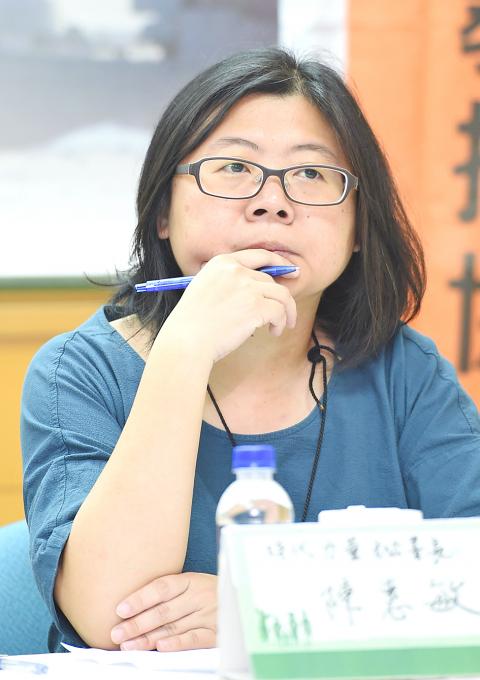Taiwan’s request to participate in this year’s International Labour Organization (ILO) conference has been rejected, marking another setback for the nation’s participation in international events, a New Power Party (NPP) official said yesterday.
The 106th session of the conference, a high-level annual event, is to be held in Geneva, Switzerland, from Monday through June 17.
NPP Secretary-General Chen Hui-min (陳惠敏) said the party was told that several International Trade Union Confederation unions and the Taipei-based Chinese National Federation of Industries (全國工業總會) have been excluded from this year’s conference.

Photo: Liu Hsin-de, Taipei Times
Union and federation representatives have been excluded on the grounds that the UN does not allow non-member states to take part in its meetings. The UN agency has 187 members.
“Union and federation representatives have taken part in the conference several times in the past few years,” Chen said.
Chen made the remarks at a meeting sponsored by the Taiwan Association of University Professors in Taipei, which discussed Taiwan’s exclusion from the World Health Assembly (WHA) last month.
Presidential Office spokesman Sidney Lin (林鶴明) said Taiwan has long participated in ILO meetings, and urged the organization to follow the precedent of letting union representatives take part in its events.
Meanwhile, Taiwan Association of University Professors president Lin Hsiu-hsin (林秀幸) said that Taiwan’s exclusion from this year’s WHA and uncertainty over whether a Taipei-Shanghai Forum would be held this year have underscored that China has been changing the mode of cross-strait exchanges over the past year.
The latest incidents “will not be the last,” she said.
Taiwan first attended the WHA as an observer in 2009, a year after former president Ma Ying-jeou (馬英九) came to power and pursued a more conciliatory China policy.
Taiwan had taken part in every WHA since then, until this year.
Its exclusion is widely seen as the latest move by China to obstruct Taiwan’s international participation, a strategy that has become more aggressive since President Tsai Ing-wen (蔡英文) came to power in May last year.
Cross-strait relations have cooled since Tsai took office, mainly due to her refusal to heed Beijing’s calls to recognize the so-called “1992 consensus” as the sole political foundation for cross-strait exchanges.
The “1992 consensus” — a term former Mainland Affairs Council chairman Su Chi (蘇起) admitted making up in 2000 — refers to a tacit understanding between the Chinese Nationalist Party (KMT) and the Chinese government that both sides acknowledge there is “one China,” with each side having its own interpretation of what “China” means.
Additional reporting by Su Fang-he

MAKING WAVES: China’s maritime militia could become a nontraditional threat in war, clogging up shipping lanes to prevent US or Japanese intervention, a report said About 1,900 Chinese ships flying flags of convenience and fishing vessels that participated in China’s military exercises around Taiwan last month and in January last year have been listed for monitoring, Coast Guard Administration (CGA) Deputy Director-General Hsieh Ching-chin (謝慶欽) said yesterday. Following amendments to the Commercial Port Act (商港法) and the Law of Ships (船舶法) last month, the CGA can designate possible berthing areas or deny ports of call for vessels suspected of loitering around areas where undersea cables can be accessed, Oceans Affairs Council Minister Kuan Bi-ling (管碧玲) said. The list of suspected ships, originally 300, had risen to about

DAREDEVIL: Honnold said it had always been a dream of his to climb Taipei 101, while a Netflix producer said the skyscraper was ‘a real icon of this country’ US climber Alex Honnold yesterday took on Taiwan’s tallest building, becoming the first person to scale Taipei 101 without a rope, harness or safety net. Hundreds of spectators gathered at the base of the 101-story skyscraper to watch Honnold, 40, embark on his daredevil feat, which was also broadcast live on Netflix. Dressed in a red T-shirt and yellow custom-made climbing shoes, Honnold swiftly moved up the southeast face of the glass and steel building. At one point, he stepped onto a platform midway up to wave down at fans and onlookers who were taking photos. People watching from inside

Japan’s strategic alliance with the US would collapse if Tokyo were to turn away from a conflict in Taiwan, Japanese Prime Minister Sanae Takaichi said yesterday, but distanced herself from previous comments that suggested a possible military response in such an event. Takaichi expressed her latest views on a nationally broadcast TV program late on Monday, where an opposition party leader criticized her for igniting tensions with China with the earlier remarks. Ties between Japan and China have sunk to the worst level in years after Takaichi said in November that a hypothetical Chinese attack on Taiwan could bring about a Japanese

The WHO ignored early COVID-19 warnings from Taiwan, US Deputy Secretary of Health and Human Services Jim O’Neill said on Friday, as part of justification for Washington withdrawing from the global health body. US Secretary of State Marco Rubio on Thursday said that the US was pulling out of the UN agency, as it failed to fulfill its responsibilities during the COVID-19 pandemic. The WHO “ignored early COVID warnings from Taiwan in 2019 by pretending Taiwan did not exist, O’Neill wrote on X on Friday, Taiwan time. “It ignored rigorous science and promoted lockdowns.” The US will “continue international coordination on infectious